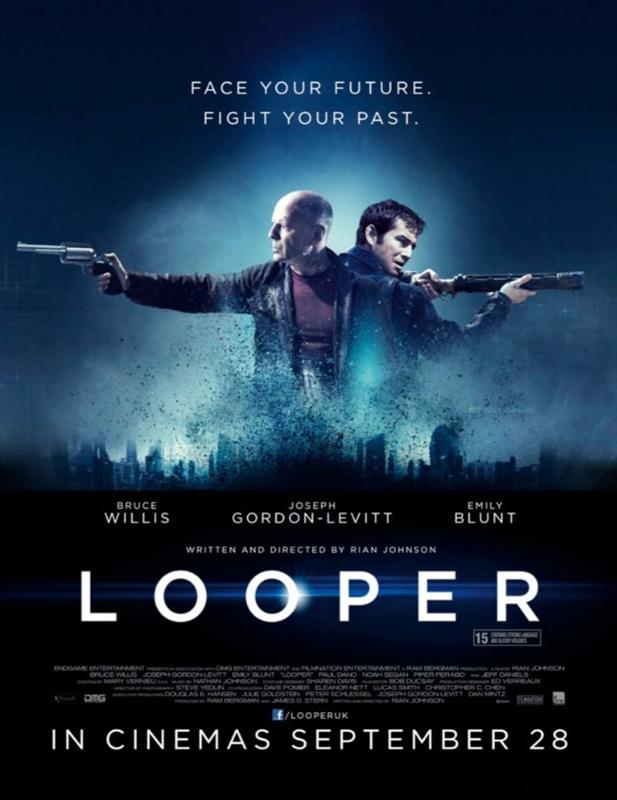Looper (2012)

In the year 2074, murder is more difficult - the hard part being the disposal of bodies, due to "trackers and things", or something. However, they do have time travel, so to get around the problem the future gangs instead capture and bind their target and send them 30 years back in time, where a waiting "looper" kills them and disposes of the body in the past (where it is apparently) still safe to do so. Loopers get their name because they cannot be allowed to exist in the future in case they tie the criminal to the murder, so they are given 30 years to do their job and then they are sent back in time to be killed by their own younger self, who gets a big payout.
Every so often, a looper finds it rather harder to kill their future self than they expect, which causes big problems for their bosses - and usually for them. One looper, Joe (Joseph Gordon-Levitt), finds it especially hard to kill his future self (Bruce Willis) when said future self comes back with tales of a dystopian future, where a most terrible crime boss has started retiring loopers early.
Time travel stories are hard to do well, because time travel is fundamentally prone to paradoxes... if things you do in the past affect your present/future, then what if they cause you not to do the things that have those effects, which means you then won't do the things that caused you to do the things that caused those effects, which means you then... yeah, exactly. The most famous example is the so-called "Grandfather paradox"... if you travel back in time and kill your own grandfather before he conceives your dad, you will never be born, so you won't be able to travel back in time and kill your grandfather. A simpler version is just to kill your own younger self.. but if you never get old, who was it who killed you?
There are a few ways to tackle the paradox issue... one solution is the 'multiple timelines' approach, where when you travel back in time you essentially create a new version of the universe where the things you do in the past happened, but they don't affect the version of the universe where you didn't travel back, so no inconsistencies arrive. The idea of multiple versions of the universe existing in parallel might seem ridiculous, but it actually fits in well with some interpretations of Quantum Mechanics. A particularly complicated example of the multiple timeline resolution is found in the film PRIMER.
Another approach is to fatalism... you cannot really affect the past because your actions in the future are already determined by the things you did in the past. When you go back in time you might think you have the power to affect your future, but no matter what you try to do everything ends up happening just as it happened before... it's possible that you even cause the things to happen that you were hoping to change. A good example of this approach is the film TIMECRIMES.
LOOPER employs neither of these approaches to the paradox resolution... things you do in the past can affect the future, which was your present pre-jump, and the universe just sort of 'works out' the paradoxes by editing reality. Or doesn't bother, depending on its mood. In LOOPER's reality things you do (or cause to happen) to your younger self have an instant and perhaps surprising effect on the time-travelled older version of you (e.g. scars suddenly appear), and if you cause your younger self to die you just disappear... even though if you never become the version of yourself that causes those things to happen, it's not clear why they happen. They just do. Unless they in fact don't. This is the "hand-wringing" approach, or the BACK TO THE FUTURE resolution... and to be honest it is no less flawed than the other approaches. Time travel simply does lead to paradoxes, and paradoxes can not be resolved in a logically consistent and coherent manner. This strongly suggests that time travel is not permitted in reality, but that doesn't mean that interesting films can't be made about it, and LOOPER manages to be interesting despite essentially washing its hands of the whole making sense business... as Bruce Willis says to his younger self, they could spend hours discussing the theory and philosophy and drawing and diagrams, but there is stuff to be done.
So, if you are not going to get too upset by logical problems in the script, LOOPER is a fun piece of sci-fi with a plot that does at least try to engage the viewer's brain. Following the cyclical causes and effects and trying to decide whether they're being consistent with their time travel makes for an entertaining viewing experience, and there is sufficient drama and action to make the a good sci-fi action film even without dwelling too much on that. The film's style is interesting, with some rather low-tech and clunky looking future technology... no light sabres or star ships in this version of our future. Characters actually have some depth, and the story manages not to be too obviously derivative of anything. Well worth a look... unless you're the type of viewer that will think "Why don't they just open their time portal above a sealed meat grinder and avoid the whole looper-future-self problem completely?" 5 minutes in, and be too bugged by that thought to enjoy the rest of the film.
Crew
| Director | |
|---|---|
| Cinematographer |

